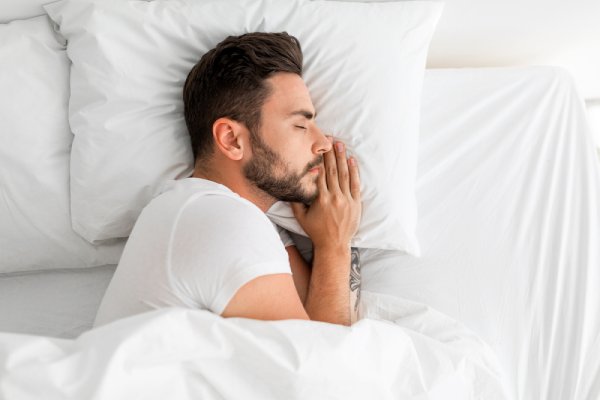
Ever wondered how much deep sleep should I get to stay healthy? Deep sleep is also referred to as slow-wave sleep which is a critical phase of the sleep cycle that supports physical recovery and brain function. Moreover, it helps to keep intact physical health and overall well-being. In addition, experts recommend spending approximately 20–25% of total sleep time in deep sleep. For an adult sleeping 7–9 hours per night, this equates to about 1.5 to 2.25 hours. Furthermore, deep sleep is most prominent during the early part of the night, making consistent bedtime routines essential. Also, deep sleep plays a pivotal role in processes like memory consolidation, immune system strengthening, and tissue repair.
Additionally, studies highlight its importance in regulating mood, reducing anxiety, and mitigating risks for various conditions. Interestingly, the amount of deep sleep naturally declines with age, with younger individuals requiring more to support growth and cognitive development. Insufficient deep sleep can lead to a weakened immune system, impaired memory, and increased risk for chronic illnesses. This guide explores further in this regard and highlights factors associated with deep sleep, making it an inevitable source of healthy being. Keep reading to gain valuable insights!
Characteristics of Deep Sleep—Exploring in Detail
To understand ‘how much deep sleep should I get,’ it is essential to know how it contributes to overall well-being. Deep sleep occurs within the third stage of sleep which is known as non-rapid eye movement (NREM) sleep. During this phase, the brain produces electrical waves referred to as delta waves, which have a frequency range of 0.5 to 2 Hertz. Furthermore, deep sleep begins within an hour of falling asleep and occurs in progressively shorter cycles as the night continues.
In addition to this, deep sleep stage is characterized by significantly reduced bodily functions. Intense repair and recovery of the bodily functions happen during this phase. Lastly, it is often challenging to wake someone during deep sleep. Hence, doing so may leave them feeling groggy or mentally foggy for up to an hour or so.
How Much Deep Sleep Should You Get a Night?
For a common man it is necessary to have at least 1.5 to 2.25 hours of deep sleep each night if their nighttime sleep accumulates for 7 to 9 hours. Moreover, deep sleep is vital for overall health, specifically for maintaining physical and mental well-being.
What Happens During Deep Sleep: Understanding the Stages
While understanding ‘how much deep sleep should I get,’ one must know what exactly deep sleep is about and what are its stages.
1. Physical Restoration
To understand ‘how much deep sleep should I get,’ it is imperative to know that deep sleep allows intense repair and recovery. Furthermore, cellular regeneration, muscle growth, and tissue repair occur as human growth hormone (HGH) is secreted. Therefore, this makes deep sleep integral for restoration purposes. Hence, it is often referred to as “restorative sleep.”
2. Immune System Boosting
Deep sleep enhances immune function by increasing the production of immune cells and antibodies, helping combat infections. Additionally, research shows that people with insufficient deep sleep are more prone to illnesses.
3. Brain Detoxification
The glymphatic system—a waste clearance system in the brain—is most active during deep sleep. Hence, it removes toxic proteins and metabolites, reducing the risk of neurodegenerative diseases.
4. Memory Consolidation
Deep sleep is critical for memory processing and learning. Moreover, deep sleep strengthens neural pathways, aiding long-term memory retention. This stage also supports emotional regulation, reducing stress and anxiety.
How Much Deep Sleep Does a Person Need?
Ever thought of how much deep sleep do you need? Well, deep sleep requirements vary with age:
- Infants (0–1 year): Infants spend up to 50% of their sleep in deep sleep to support rapid growth and brain development.
- Children (1–12 years): Deep sleep accounts for approximately 30–40% of their total sleep to sustain physical and cognitive growth.
- Teenagers (13–18 years): Around 25–30% of sleep is deep sleep, supporting learning and hormonal changes.
- Adults (19–64 years): Adults require 20–25% of deep sleep, which decreases gradually with age.
- Older Adults (65+ years): Deep sleep can drop below 20% due to natural aging, though maintaining high sleep quality remains essential.
As much as sleep is underestimated and taken for granted, it is imperative to understand the role it plays for a healthy life. Not having a sound sleep for a persistent period indicates underlying sleep disorders like sleep apnea or insomnia etc. These may further exacerbate, resulting in mental and physical health risks. Therefore, it is crucial to consult sleep experts for restoring healthy deep sleep.
Why Is Deep Sleep Important for Health?
1. Heart Health
To understand ‘how much deep sleep should I get,’ it is vital to know its overall impact on health. Deep sleep stabilizes blood pressure and reduces the workload on the heart. Furthermore, poor deep sleep is linked to increased risks of hypertension and cardiovascular diseases.
2. Weight Management
Lack of deep sleep disrupts hunger-regulating hormones, ghrelin and leptin, leading to overeating and weight gain. Yet another reason to understand ‘how much deep sleep should you get.’
3. Glucose Regulation
Studies show deep sleep plays a role in maintaining stable blood glucose levels. Hence, prolonged deficits can increase the risk of type 2 diabetes.
4. Mental Clarity and Productivity
Waking up after sufficient deep sleep ensures mental clarity, better focus, and higher productivity. Therefore, this is especially important for students and professionals with cognitive demands.
Factors Affecting Deep Sleep
Several lifestyle and environmental factors can influence the quality and duration of deep sleep:
- Stress: Chronic stress increases cortisol levels, disrupting the sleep cycle and reducing deep sleep stages.
- Age: Aging naturally reduces the proportion of deep sleep. However, staying active and healthy can mitigate some of this decline.
- Caffeine and Alcohol: Caffeine can reduce deep sleep by stimulating the nervous system. Also, alcohol, while initially sedative, disrupts sleep cycles later in the night.
- Sleep Environment: A noisy, uncomfortable, or excessively lit sleep environment can interrupt deep sleep.
The Consequences of Insufficient Deep Sleep
It is significant to understand ‘how much deep sleep should I get,’ as chronic deficits in deep sleep can have serious health implications:
- Cognitive Decline: Increased risk of Alzheimer’s due to inadequate brain detoxification.
- Weakened Immunity: Reduced resistance to infections.
- Mental Health Issues: Higher stress, anxiety, and depression levels.
- Chronic Diseases: Elevated risk of obesity, diabetes, and heart disease.
- Reduced Longevity: Consistently poor sleep can shorten lifespan.
To Wrap Up
Deep sleep is the cornerstone of a healthy life, influencing physical recovery, mental acuity, and emotional balance. In addition, it is important to understand ‘how much deep sleep should I get,’ as individual needs for deep sleep vary strongly. Furthermore, most adults should aim for 1.5 to 2.25 hours per night, constituting about 20–25% of their sleep duration. Failing to achieve sufficient deep sleep can lead to serious health issues.
Also, to optimize deep sleep, focus on cultivating healthy habits like maintaining a consistent sleep schedule, managing stress, and implementing mindfulness. If sleeplessness persists, consult sleep experts through sleep telemedicine service. Finally, as research continues to unveil the intricate role of deep sleep, its significance as a pillar of health becomes increasingly evident. By prioritizing this vital stage of rest, you can ensure a stronger body, sharper mind, and improved quality of life.

